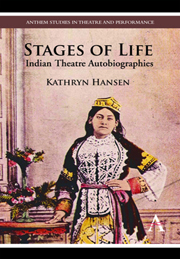Book contents
- Frontmatter
- Contents
- Illustrations
- Preface
- Acknowledgments
- PART 1
- PART 2
- 3 Narayan Prasad Betab, The Deeds of Betab
- 4 Radheshyam Kathavachak, My Theatre Days
- 5 Jayshankar Sundari, Some Blossoms, Some Tears
- 6 Fida Husain, Fifty Years in the Parsi Theatre
- PART 3
- Appendix 1 Historical Personages and Institutions
- Appendix 2 List of Plays and Films
- Glossary: Hindi and Urdu Terms
- Bibliography
- Index
5 - Jayshankar Sundari, Some Blossoms, Some Tears
from PART 2
Published online by Cambridge University Press: 05 March 2012
- Frontmatter
- Contents
- Illustrations
- Preface
- Acknowledgments
- PART 1
- PART 2
- 3 Narayan Prasad Betab, The Deeds of Betab
- 4 Radheshyam Kathavachak, My Theatre Days
- 5 Jayshankar Sundari, Some Blossoms, Some Tears
- 6 Fida Husain, Fifty Years in the Parsi Theatre
- PART 3
- Appendix 1 Historical Personages and Institutions
- Appendix 2 List of Plays and Films
- Glossary: Hindi and Urdu Terms
- Bibliography
- Index
Summary
Introduction
In the next two autobiographies, the memoirs of poet-playwrights give way to those of actors. Both Jayshankar Sundari and Fida Husain enjoyed sustained, successful careers on the professional stage. Sundari entertained fans for over three decades, while Fida Husain performed and directed plays for half a century. Sundari was formally attached to the Parsi theatre for only a few years. His apprenticeship with the Calcutta-based company of Dadabhai Thunthi created the foundation for his meteoric success once he began to perform in Bombay. The close connections between the worlds of Parsi theatre and Gujarati theatre toward the end of the nineteenth century make it logical to include Sundari's autobiography in this volume. The two theatres shared a pool of actors and musicians, and worked in the same playhouses. They both employed the Gujarati language, although by Sundari's time plays in Urdu dominated the Parsi theatre. The chief difference was in the owners, who tended to be Parsi merchants on the one hand and Gujarati Hindu merchants on the other.
In the early twentieth century, leading Parsi and Gujarati companies still hired men to perform women's roles. All the autobiographies mention this practice as routine, just as they refer to the employment of women as actresses, which had begun in some companies, as problematic. None of the other autobiographies, however, describes how it felt for a man to play a woman's role.
- Type
- Chapter
- Information
- Stages of LifeIndian Theatre Autobiographies, pp. 170 - 245Publisher: Anthem PressPrint publication year: 2011



